| SHADOWS ON THE WALL | REVIEWS | NEWS | FESTIVAL | AWARDS | Q&A | ABOUT | TALKBACK | |||||
 Shadows off the beaten path Shadows off the beaten pathIndies, foreign, docs and shorts...
On this page:
THE PRINCE |
NOBODY KNOWS I'M HERE |
YOUNG AHMED
| |||||
| See also: SHADOWS FILM FESTIVAL | Last update 27.Jun.20 | |||||
|
The Prince El Príncipe MUST  SEE SEE
Review by Rich Cline | 
| |||||
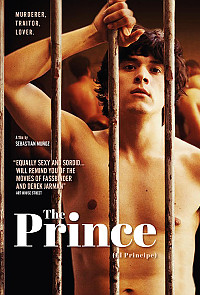 dir Sebastian Munoz Costa del Rio scr Luis Barrales, Sebastian Munoz prd Marianne Mayer-Beckh, Roberto Doveris with Juan Carlos Maldonado, Alfredo Castro, Gaston Pauls, Cesare Serra, Lucas Balmaceda, Sebastian Ayala, Jose Antonio Raffo, Paola Volpato, Nicolas Zarate, Jaime Leiva, Daniel Antivilo, Catalina Martin release US 10.Jul.20 19/Chile 1h36 VENICE FILM FEST  > >Watch it now... |
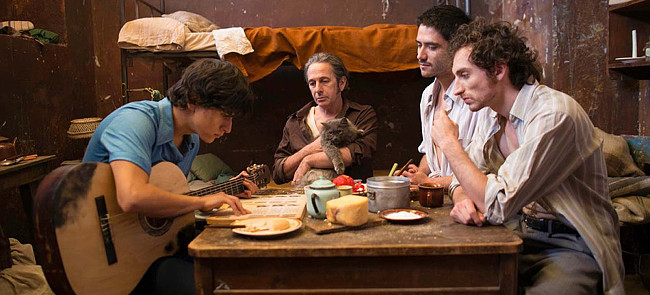 A lurid 1970s vibe gives this prison drama a remarkable kick, as first-time filmmaker Sebastian Munoz vividly evokes the tone of a trashy pulp thriller with graphic settings and characters. It's strikingly designed and shot with strongly homoerotic overtones, unapologetic about sex, violence or nudity. While it's perhaps too full-on for mainstream audiences, the film has a riveting power that brings out some haunting underlying themes. In early 70s Chile, 20-year-old Jaime (Maldonado) is sent to a grubby prison for murder, entering a cell with four inmates who share two beds. Leader Potro (Castro) shows him the ropes then sexually assaults him on the first night, initiating him into the family. He also finds a guitar for Jaime to play, and as Jaime usurps the favoured position from another boy (Ayala), he acquires the nickname "The Prince". Then the preening Che Pibe (Pauls) turns up, wanting this cell for himself. And Jaime catches the eye of Che Pibe's boy Rucio (Balmaceda), The prison is so squalid that it seems exaggerated (but probably isn't), as the inmates must provide their own food and medical care, banding together as family units. Jaime's backstory is seen in flashback, happily cavorting with friends, learning about sex from an older woman (Volpato), having an instinctual attraction to his womanising pal Gitano (Serra), being rejected by his parents and committing a crime of passion. For Jaime, life behind bars is liberating by comparison. "Never come back," he tells his father during a prison visit. Maldonado has a crisp presence as this intense young man. It's a full-bodied performance that's complex and engaging, drawing us in as he begins to flex his power. He holds his own strongly opposite the always excellent Castro, who is provocatively relaxed as Potro, the cock of the walk. Although the guards remind him who's in charge. Castro also beautifully plays Potro's underlying insecurity as his authority is threatened by Jaime, as well as Che Pibe and Rucio, played with charismatic confidence by Pauls and Balmaceda. Munoz has a terrific eye for detail, catching glimpses of internalised thoughts and feelings in unexpected places. He skilfully shifts imagery from squalid to raw beauty, allowing the viewer to experience a collision of senses. And connections between the characters are continually shifting in unexpected directions that defy the genre, finding tenderness and humour even in some very rough moments. It's a remarkably earthy film, so visceral that it already feels like a timeless classic.
| ||||
|
Nobody Knows I’m Here Nadie Sabe Que Estoy Aquí Review by Rich Cline |  MUST
MUST  SEE SEE
| |||||
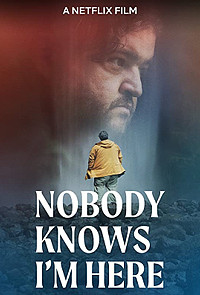 dir Gaspar Antillo prd Juan de Dios Larrain, Pablo Larrain scr Enrique Videla, Josefina Fernandez, Gaspar Antillo with Jorge Garcia, Millaray Lobos, Luis Gnecco, Alejandro Goic, Gaston Pauls, Lukas Vergara, Vicente Alvarez, Roberto Vander, Solange Lackington, Juan Falcon, Eduardo Paxeco, Nelson Brodt release US/UK 24.Jun.20 20/Chile Netflix 1h32 Watch it now... |
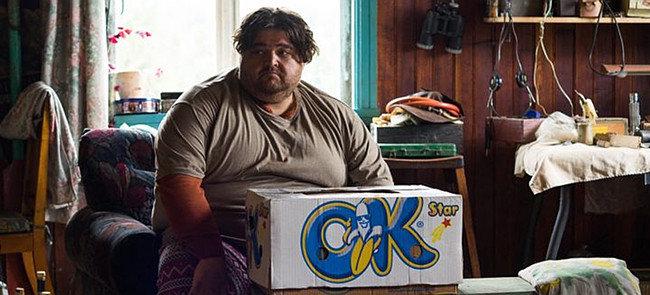 With his feature debut, Chilean director Gaspar Antillo creates an involving drama that has echoes of Searching for Sugar Man. A slow-paced, often silent arthouse film, it's both charming and provocative, beautifully shot by Sergio Armstrong in lush locations and populated with likeably offbeat characters. The story addresses a cruel aspect of popular culture, but it keeps things very personal, which gives the film a potent emotional kick. Isolated across a Chilean lake, Memo (Garcia) has loved singing all his life but has long been hiding his voice from the world, for a reason. Working with his irritable sheep-farmer Uncle Braulio (Gnecco), Memo also sneaks around empty lakefront houses and sews brightly sequinned costumes, paints his nails with glitter and practices his dance steps. Then Memo's reclusive existence begins to unravel with the arrival of curious new supply runner Marta (Lobos). As they become close, she tries to get him to re-enter the world. Then a journalist (Paxeco) threatens his comforting anonymity. Memo's backstory emerges through flashbacks, as producers discover the angelic voice of the chubby young Memo (Vergara) but decide to have it lip-synched by more fangirl-friendly dreamboat Angelo (Alvarez), who grows up to become a megastar (Pauls). So when Marta discovers Angelo's autobiography in Memo's room, his reaction is a sudden mix of conflicting emotion. There are several further momentous revelations to come, and Antillo lets them they play out with a remarkably subtle touch, adding layers to Memo's heartbreaking experiences. In an almost wordless performance, Garcia reveals Memo's inner journey with engaging nuance, skilfully deploying his gentle-hulk presence. Watching him light up when he sings or dances is lovely, and his visceral reaction when his past is exposed is (ahem!) gut-wrenching. His climactic moments are simply astonishing. Both Lobos and Gnecco are terrific opposite him, evoking gorgeous interconnections; Goic brings some shocking edge as Memo's showbiz dad; and Pauls adds superb layers of meaning later on. The story develops its tension lyrically, never playing up the sensationalism that that begins to swirl around Memo. This allows the film to gently touch on much bigger themes, from the unfair nature of fame to more internalised issues of bullying and self-expression. The plot continues to shift in the final act, adding further complications and finding difficult truths. Memo needs to realise that the fantasy in his mind is actually his reality, while hiding himself in a hermit-like existence is what's fake.
| ||||
|
Young Ahmed Le Jeune Ahmed Review by Rich Cline | 
| |||||
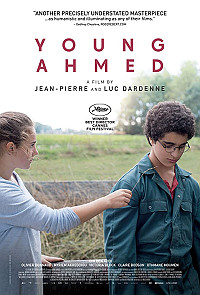 dir-scr Jean-Pierre Dardenne, Luc Dardenne prd Jean-Pierre Dardenne, Luc Dardenne, Denis Freyd with Idir Ben Addi, Olivier Bonnaud, Myriem Akheddiou, Victoria Bluck, Claire Bodson, Othmane Moumen, Amine Hamidou, Yassine Tarsimi, Cyra Lassman, Karim Chihab, Nadege Ouedraogo, Frank Onana release Bel 22.May.19, US 19.Jun.20 19/Belgium 1h24 CANNES FILM FEST Watch it now... |
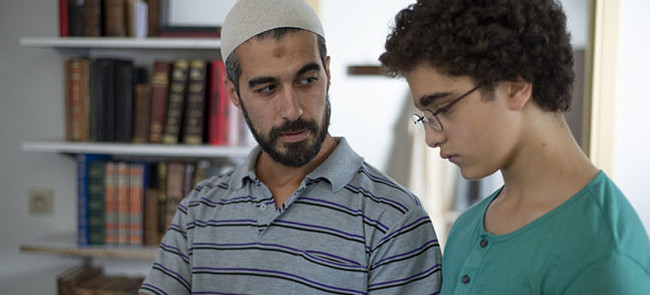 With their usual observant, insightful filmmaking, the Dardenne brothers sharply capture the personalities and attitudes of almost unnervingly normal people in an extraordinary situation. This is a vivid depiction of religious fervour in a pliable mind conditioned to ignore the fact that their false beliefs actually violate their faith. In this sense, the film has much wider implications. But the story is specific, personal and quietly riveting. In Belgium, devout Muslim teen Ahmed (Addi) is annoyed that his non-religious mother (Bodson) insists he show respect to his teacher Ines (Akheddiou), a Muslim who is critical of his extremist mosque. As Ahmed becomes increasingly combative, his mother also begins to worry that he's being radicalised by Imam Youssouf (Moumen). Sure enough, Youssouf has convinced Ahmed and his brother Rachid (Hamidou) that Ines is a blasphemous apostate, so Ahmed attempts to kill her. Arrested and sent into the reform system, Ahmed is determined to remain faithful. Ahmed's delusional beliefs are frankly terrifying, as he refuses to even discuss them, blindly believing what Youssouf taught him to the point where lies, hatred and even murder are acceptable. And while he's very intelligent, he's so blinded that he can't see how these things contradict the nature of Islam. He believes he's a true Muslim, unlike the reasonable people who are trying to get through to him, including his mother, Ines and his caseworker (Bonnaud). To Ahmed, his violent impulses are divinely inspired. None of the cast members seem to be acting, playing the roles as real, messy people who are largely oblivious of their flaws. So Addi impressively never once tries to brush away Ahmed's thought processes, simply inhabiting this over-serious boy and his carefully constructed belief system, which feeds into how he reacts to everything others say to him. His most fascinating interaction is with Louise (Bluck), a girl his age whose curiosity about him begins to whittle away at his armour. With the Dardennes' casual, offhanded approach, there are moments in this film that raise almost unbearable levels of churning suspense. And there's also a gnawing sense that the social system is simply unable to see the turmoil in Ahmed's mind. In this sense the film never even attempts to offer an answer to the enormous question it raises. But it does come to a head several times, as Ahmed's wilfully warped version of Islam leads him to treat himself and others in heart-stopping ways. And he's still just a boy.
| ||||

See also: SHADOWS FILM FESTIVAL © 2020 by Rich Cline, Shadows
on the Wall
HOME | REVIEWS | NEWS | FESTIVAL | AWARDS
| Q&A | ABOUT | TALKBACK | | ||||

